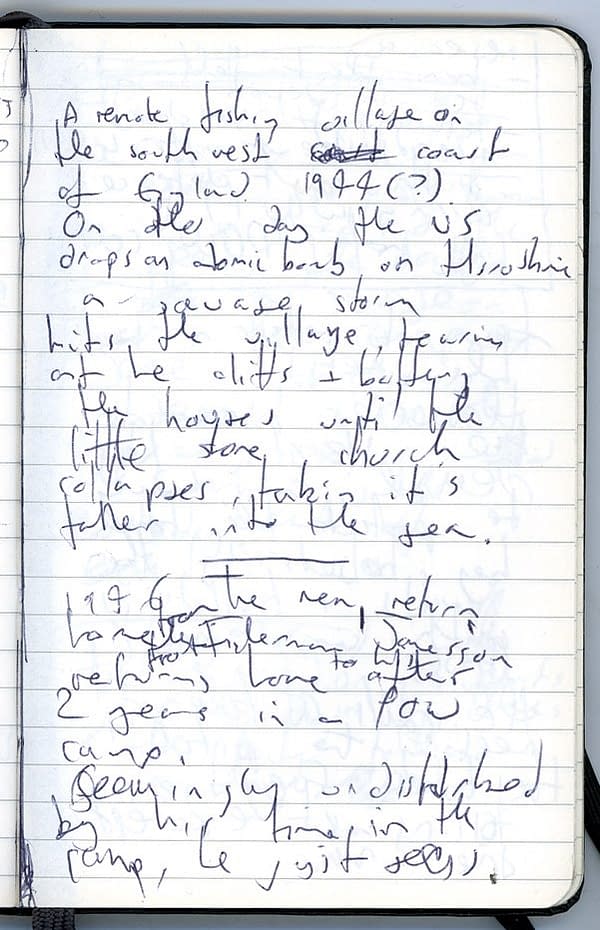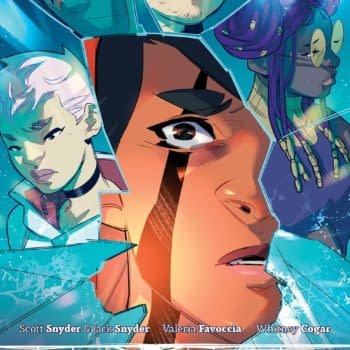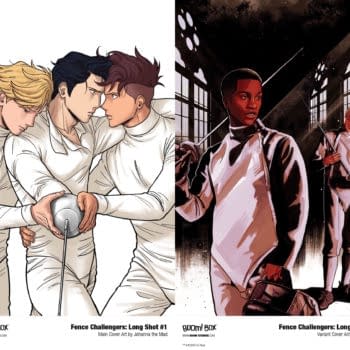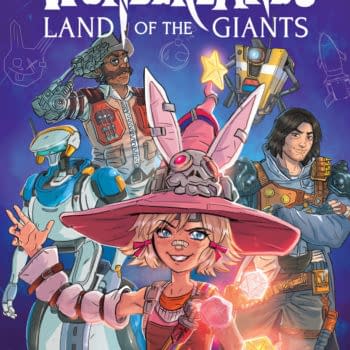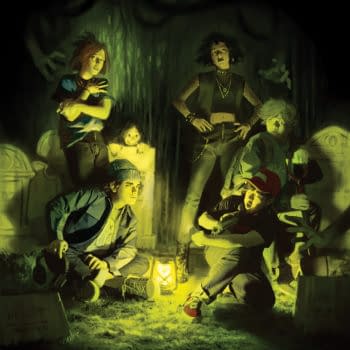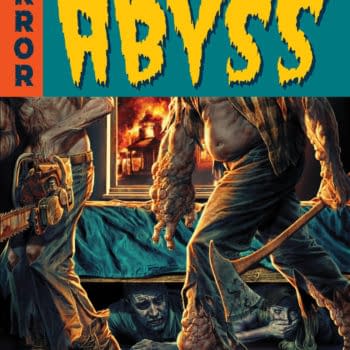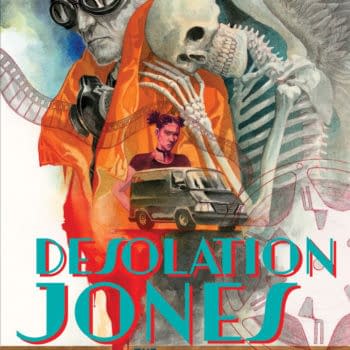Posted in: Comics, Recent Updates | Tagged: 2000ad, Comics, entertainment, Martin Stiff, The Absence, Titan comics
The Absence Is A Dark WWII 'Mystery Play' – The Bleeding Cool Interview With Martin Stiff
This week, Titan Comics releases new graphic novel The Absence, written and illustrated by designer, writer, artist, and 2000AD fan Martin Stiff. He originally produced the comic in single issues over a five year period, but now the wide-ranging thriller of a story is complete, unraveling the mysteries that link World War II veteran Marwood Clay, his coastal Cornish home town, and dark, inexplicable events from his past. It's a story that defies genre classification from mystery, to war, to gothic elements, though defined further by Titan as "supernatural", and builds up tension in nearly every panel, leaving a lingering sense that the universe is well beyond human control.
Martin Stiff spoke with Bleeding Cool about the long journey from initial idea to completed collection, and why it's only led to bigger ideas for him as a comics creator.
Hannah Means-Shannon: I'll start with a strange question: what was the very first moment the initial idea or hint of creating The Absence came about for you, and why did you decide to pursue it?
Martin Stiff: There really isn't one specific moment I can pin down – it's more a whole series of moments. The Absence is really a mixture of stuff that interests me which I've stored up over the years from books I've read, documentaries I've seen and whatnot.
I suppose if I had to find one specific thing which help spark the story into being it would've been the BBC TV show Coast. It's a documentary series, staple Sunday night tea-time fare, about the history of Britain's coast line. I love that sort of stuff, and one episode I caught was a tragic story about a very specific town. I won't say too much about it, or name the town, because it's a bit of a spoiler, but it certainly helped to coalesce some of the ideas I'd been having and gave them a focal point. I talk more about it in the extras at the back of the book because it's a story which is as relevant today as it was when it happened 100 years ago.
HMS: I understand from your blog that you've been working on the chapters of this collection for five years. What made you commit to such a lengthy process? Were there times you were tempted to abandon it?
MS: It wasn't like I committed to the 5 year thing from the start. I knew it was going to be a six issue miniseries and I had a rough idea of what was going to happen in each chapter but I had no idea how long it was going to take me. Despite having the overall story planned out, the thing grew as it went along – the first part is only 24 pages but chapter 5 is 62 pages or something ridiculous. I wanted to make sure the story evolved organically so didn't want to force it into places it didn't seem to want to go which meant certain story lines got sort of abandoned and other things developed, all at it's own pace. To be perfectly honest, it took five years because I've got a young family and a full time job as a graphic designer. If I'd known from the start how long it'd take, would I have carried on? No idea. I certainly hope so. Weirdly, there was never really a time when I wanted to abandon it. I was making the comic purely for it's own enjoyment – the length of time it took was less important to me than the process of doing it. That said, I (and my family) were massively relived when it was all done…
HMS: How would you define the genre or combinations of genre present in The Absence? What sort of genres appeal most to you as a reader or as a storyteller?
MS: That's a tough one. Douglas Adams called Dirk Gently's Holistic Detective Agency "a kind of ghost-horror-detective-time-travel-romantic-comedy-epic" which I really like. The Absence is hard to pigeon hole. I guess it's a WWII-horror-thriller-whodunnit-science-fiction-soap-opera. It wasn't my intention to make it so hard to categorize – they're just the genres that I enjoy the most so tend towards whenever I'm writing. As I said earlier, pulling in so many influences and ideas meant it was a bit of a soup. I wanted the beginning to feel very different to where it ends up. What seems like a traditional war-time drama ends up (quite literally) exploring the universe.
I'm very much a fan of trade collections, more than I am individual comics. I know the argument is that trades are killing the industry but frankly they fit my lifestyle. I don't have time to go to the comic shop every month – it's far easier to wait for a collection and they're usually more satisfying reads as well. It's the same mentality as binge TV, watching 4 back to back episodes of True Detective is way more enjoyable than waiting a week for each one, so the bigger the collection the better. I bloody love things like the Marvel Omnibuses. Generally I'm not a huge reader of comics. I have creators I like and look for and stuff like 2000AD will always hold a special place in my heart but I tend to read more books than I do comics. I think that's really why The Absence is such a long, sprawling story.
HMS: At one point Robert Temple says he wants to understand the "machinations of the universe, of time and fate". That seems resonant in a book where characters, and readers, are constantly seeking answers. Is that a way of building suspense in the story, or are you going for a bigger theme of the dangers of too much knowledge or power?
MS: Temple's desire to try and understand the universe on a micro-level stems from a seemingly entirely random accident that caused the death of his parents. By trying to see the clockwork mechanism that runs behind life he hopes, ultimately, to be able to manipulate it. I think everyone, at one time or another, feels a bit hard done by or that 'fate' (for want of a better word) has been unfair. We're awash in a sea of uncertainty and chance, buffeted from one event to the next with no apparent control over any of it. Who wouldn't want to try and impose order on that if we could?
The Absence is a mystery play – everyone in it has their secrets which I try and tease out slowly across the book but really the bigger mystery is how the secrets all connect to each other. And then, of course, the biggest secret is revealed and it's something that *nobody* has any control over.
HMS: What is it about the legacy of World War II that compelled you to create such an intense story around it? How do you think the war still influences us today?
MS: I've always been interested in WWII. I'm 40 and so part of the generation that was raised by people who fought in the war and I think it's part of what defines who we are. That global, epic tragedy that everyone had to deal with in distinctly personal ways. My grandfather spent most of the war as a POW and would never talk about it but he was certainly haunted by what happened. I mean – he was *literally* haunted. Even after returning home he would see his dead friends standing at the foot of his bed. How does an experience like that inform how he brings up his children, and they theirs? I don't think we can ever escape the influence of what people went through, it's part of our national psyche now.
Fictionally speaking, WWII is just such a rich area. There's so much there to play with, so many things you can tap into for allegory. The sense of isolation and dislocation that Marwood Clay endures is something everyone can relate too, but putting it through the prism of a returning war veteran adds an extra layer of tragedy and poignancy. And that's even before you get to all the weird science and technology shit that was developed with the sole intention of killing lots of people. There's just so much history there to explore.
HMS: Having completed this massive project, what's on the horizon for you? Are you going to stick to shorter works, or will there be more long form stories in the pipeline?
MS: Much to the annoyance of my incredibly understanding wife, I'm already in the early planning stages of my next project. It probably won't be *quite* as large as The Absence, but it's another long-form graphic novel. It's a kind of spy-caper set during the Cold War in Berlin but with a weird fantasy angle. I'm also toying with a biographical comic about an artist that I think would make an interesting book, but don't want to say too much about that at the moment. It could be pretty scandalous if I don't handle it with a bit of care.
In between planning the next big project I'm also taking a moment to enjoy doing a few shorter things, too. I have a story that I'm writing and drawing for the summer issue of Zarjaz, the 2000AD fanzine. I'm a massive fan of 2000AD so this seemed as good as any way of playing in that world. On top of this I also run a design studio called Amazing15 and that consumes a lot of my time. I'm really lucky to have a whole bunch of ways I can indulge my creative urges.

Hannah Means-Shannon is EIC at Bleeding Cool and @hannahmenzies on Twitter




